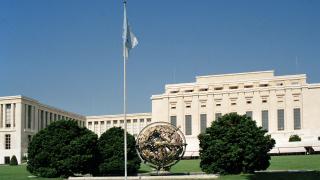
On 11 June the UN Secretary-General initiated the hunt for the next UN's next High Commissioner for Human Rights (HCHR). She or he will begin the job on 1 September.
Building on our work to make UN appointments merit-based, open and inclusive, UNA-UK has launched a 10-week campaign to find the best person for the job alongside an appeal for funds to reach the widest possible audience.
The campaign will:
- address the highly politicised context through civil society pressure on states to support the Secretary-General in finding and appointing the best possible candidate from a diverse and experienced field
- monitor and report on the process as it unfolds using a ‘transparency’ checklist based on best practice from across the UN system
- work with UNA-UK's large civil society network to raise awareness of the call for nominations and encourage partners to lobby their governments on the importance of a merit-based appointment
- facilitate public participation and debate on the demands and priorities of this role
- provide a campaign hub which aggregates the strands mentioned above as well as expert commentary and resources on the appointment
Why this matters
The High Commissioner for Human Rights is one of the most important jobs in the world. As the principal human rights official of the United Nations, the postholder is tasked with promoting and protecting all human rights for everyone, everywhere. At a time when human rights are under attack across the world, including in some of the most powerful countries, she or he is at the forefront of defending the international community’s commitment to the universal idea of human dignity.
The United States' decision to withdraw from the Human Rights Council makes it even more important that an outstanding individual is appointed who can rise to the challenges at hand.
The vastness of the responsibilities of the Office of the High Commissioner for Human Rights is at odds with its extremely constrained budget. It receives just 3.7% of the UN’s core budget – roughly $200m over two years. Much of the Office’s impact, therefore, comes from the HCHR’s role as a strong advocate and effective diplomat for the protection of human rights and human rights defenders.
This appointment matters hugely. A thorough, inclusive process will produce a stronger field of candidates and increase the chance of finding the best possible person for this impossibly challenging job. Transparency is vital: the future postholder’s credibility and mandate will be strengthened if it is clear that they have come through a thorough, competitive and meritocratic recruitment process.






